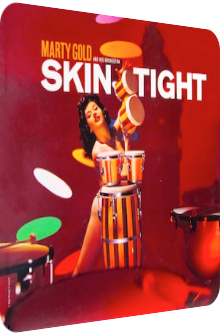
Marty Gold
Skin Tight
1960
Martin Gold (1915–2011) – better known under his nickname Marty, not to be mixed up with Morton Gould – isn't one of your typical conductors of whom you would expect a great Exotica record. He was the bandleader of the Korn Kobblers, a satirical fun band that makes The Three Suns look grave and grim in comparison, a composer of manifold styles and genres, among them the Space-Age shtick, and published several records per year. So does the quality degrade in consideration of this lifestyle on the edge? I cannot say for sure, as I do not even know 5% of Mr. Gold's output. In terms of Skin Tight though, released in 1960 on RCA Victor, there is no question about the vivid bang and the positive vibe. Gold puts the focus on exotic drums and percussion devices, but does not mention this fact in the title – as many other exotic albums in the late 50's and early 60's did – in order to surprise the listener all the more.
A look at the back sleeve then reveals mostly everything, as it prowdly showcases the many instruments that were used to create the usual twelve aural panoramas: congas, bongos, djembes, timpani, you name it… they are all in there, and incessantly juxtaposed to great brass fanfares which are not necessarily played over the top, but inherit a punch and verve that is both euphonious and powerful. It is hard to describe, but all the greater on the album which is luckily available in digital download stores. Sure enough are there Exotica classics like Caravan and Hawaiian War Chant on there, and they admittedly do not cause raised brows once the Exotica connoisseur approaches them, but their vivid bongo-infused transformations are very catchy and great, with utterly exotic but less-known material thrown in. Regardless of the mood or atmosphere, the drums are always on the forefront. But Gold is able to reduce their glaring presence if necessary and keeps a, well, skin tight formula without any ornaments. This is apparent on three particular tracks, but more about this later. The compositions are as important as the arrangements, and with these thought in mind, I'm revisiting Skin Tight and dare a closer look.
Juan Tizol’s Perdido is the gateway to Gold’s resplendent Lounge. And right from the get-go is the listener greeted with a magnanimous amount of bongos, timpani and congas. In unison with the swinging brass sections, the jazzy double bass backings, the smashing cymbals and gentle maracas, it makes up for a great start of the album. The improvised drum solos as well as the main melody being played on the timpani are great additions. The stereo effect is great, the lead saxophone dirty, and the impression that this is a high-quality album rises with every note. Allah’s Holiday continues the good fun even more, since this seldom considered composition by Otto Harbach and Rudolf Friml marries mystical wind chimes with convivial flutes, a manic bongo pattern and silky horns. Whatever instrument is upfront in any given moment and whichever tonality is in place, Gold makes sure that the hollow bongos and clicking claves remain audible. The setting may be decidedly jazzy, but the drums as well as the arcane brass outbursts add a pinch of a faux-Oriental setting to the table. Splendid!
Duke Ellington’s Caravan is next, and it expands the Middle Eastern flavor in the boldest way. The legato strings are spectral, the pizzicato brethren exhilarative, but in tandem with the bongos, the mysterious mood outweighs any tipsy scent. Luckily enough, the conductor decides to keep the majesty flowing, there is no sudden tempo shift or ebullient brass fanfare as it is often the case in many a rendition. As a result, this version of Caravan lacks energy, true, but what it lacks in dynamics it gains in coherence, making it one of the surprisingly few takes that keep a specific mood intact from the beginning till the end.
Richard Rodgers’ and Lorenz Hart’s Lover appears, and both the tempo and the mercurial atmosphere are resurrected, with frantically spiraling brass sections and show tune-evoking timpani parts meshing well with the classic drum kit, the large amount of congas and related drums. The main melody is again played on the timpani, and I wonder why this trick is not (or better: was not) used more often on records of the time. Be it as it may, Lover is anything but a cliché-laden romance. While Marty Gold’s rendition of Song Of India bases on the arrangement by Tommy Dorsey, consequentially revs up the brass instruments and rounds them off with the expected congas, bongos and positively weird flute infusions, the final song of side A, Irving Berlin's (I Wonder Why) You're Just In Love, proves to be the string-heavy counterpoint, with more pizzicato droplets than necessary and too much saccharine glee for my taste, making it the lackluster black sheep which even the bongos cannot rescue.
Side B opens with Harold Weeks’ and Oliver Wallace’s Hindustan, entangling an eclectic beat pattern with spy theme-like droning brass sections that turn much milder over the course of the tune, a Dixieland-evoking lead trumpet and the occasional usage of Space-Age flutes that even move into Chinese waters at times. Up next is one of the most unusual Exotica treats if there ever was one, making me wonder why so few bands consider this piece: James Weldon’s Dry Bones anthem, also known as Dem Bones by many children, is pitch-perfectly transformed into a magnificent brass version. The horns are gleaming in all colors, and the main melody played on the timpani as well as the occasional Latinized chant are huge bonuses, especially in the given context of the tune. Gold could not have possibly crammed better ideas in this tight corset. A swinging masterpiece!
Morgan Lewis’ How High The Moon is the next super song to my ears, as Marty Gold shows the same patience he already did on Caravan: instead of featuring one too many weird additions, this tune remains in romantic, syrupy string-heavy legato climes. The tempo is upheld throughout the tune, and it is only in the last minute that the bongos are heating up mildly, providing a few molecules of energy without destroying the depicted reverie. I for one like the dreaminess coupled with the bongos.
Sy Oliver’s Opus One would be another typical jazzy big band offering with double-bass backings and this – now utterly expected – bongo base frame, if it were not for the warbled flutes which complement the horn superstructure. Opus One is also noteworthy for the seemingly improvised bridges that are not overly memorable. However, it is here that Gold unleashes more drums than before, thus making them more interesting. The album closes with two Exotica classics: Hawaiian War Chant is based on Johnny Noble’s arrangement and hence neglects the exotic flavor in regard to the instruments. Don’t expect any ukuleles or vibraphones. Mind you, the varying rhythm patterns and the textures of the bongos make up for the loss of paradisiac notions. And to be honest, the vivid brass sections are neither the worst choice, nor an audacity.
The final Jungle Drums, originally written by Ernesto Lecuona, lives up to its name, as all of the preceding drums are featured – or rather over-exposed – in this wild version. Lecuona’s original, however, is more keen on the depiction of a lush, almost celestial depiction of the jungle rather than a crazy ritualistic outlook. And so Gold does the right thing and delivers the third incredibly stringent composition after Caravan and How High The Moon: the strings seem to come from another world, as they are as doped and warped as on Les Baxter’s records, with the bongos providing a steady, but strangely inferior ingredient of the song. Make no mistake, though: this is a fantastic interpretation and one of my favorites of the album, thanks in large parts to the strings. A magnificent outro.
Skin Tight is a great and fun ride through many Exotica classics and potential material that never turned out to be a part of the genre's canon. While the purpose of the album is the dedicated music fan who insists on an audiophile stereo recording in order to positively shock visiting friends, the compositions turn out to be the actual stars of the LP and, continuing the closer look, the drums themselves are the stars of each composition. Whether they are underlining and accentuating the luminescent strings and delicious brass sections or are used for solo performances, these devices are top-notch, sound great and add the important exotic flavor. Without them, Skin Tight would have been a good showcase album for brass lovers and orchestra string afficionados, but since the drums are kept alive on every note, they provide the important link to the Exotica genre. And how tremendously cool is the anomaly of the main melodies being played on the timpani? This trick elevates the album to the ethereal realms of the tiki gods and makes it something special. Topping things off is Marty Gold's will to decrease the tension whenever necessary. It would have been easy to frantically beat the drums again and again, but on Caravan, for instance, the atmosphere is maintained and the bongos and congos are used as accentuating devices. The rhythm remains the same, and this fact is all the more refreshing, as the hundreds of Caravan versions out there are always played to impress the listener with a convoluted eclecticism and twisted fugues. But not here.
Skin Tight is a great album for bongo lovers and fans of Don Ralke, Tito Puente, Terry Snyder or Pérez Prado's suites. But even big band followers in the traditional, jazzy sense are in for a real treat. Gold delivers one of the liveliest LP's during the vintage Exotica craze. Highly recommended and easily available on iTunes, Amazon and Co. It does not reach the highest-class gold (!) standard, but comes pretty close. Oh, and it has the craziest version of Dem Bones you can possibly find – earworm alert!
Further reading:
SpaceAgePop features a detailed article about Marty Gold, his life and many records. Worthwhile!
Exotica Review 179: Marty Gold – Skin Tight (1960). Originally published on Feb. 9, 2013 at AmbientExotica.com.
